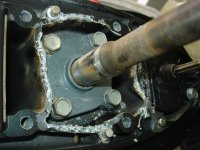I am looking to buy my first C-dory. I have a question about outboard motor long term exposure to salt water.
I have a 16 foot fishing boat that I use on the Kenai River in Alaska. I bought it in 2000 and it has a 35hp Honda 4-stroke. When I bought it, the previous owner had used the boat occasionally on Cook inlet, but always flushed the lower unit with fresh water (garden hose adapter with engine running) when finished. Even with that, I notice minor pitting in the aluminum when I remove the engine cover and look down the inside of the engine housing.
With this experience, and the desire to purchase a c-dory with a good engine, can someone tell me, who have moored their c-dory for months in a marina, what does the constant exposure to salt water do to your engines?
How do you minimize the exposure to salt water in these cases?
Thanks,
Terry
I have a 16 foot fishing boat that I use on the Kenai River in Alaska. I bought it in 2000 and it has a 35hp Honda 4-stroke. When I bought it, the previous owner had used the boat occasionally on Cook inlet, but always flushed the lower unit with fresh water (garden hose adapter with engine running) when finished. Even with that, I notice minor pitting in the aluminum when I remove the engine cover and look down the inside of the engine housing.
With this experience, and the desire to purchase a c-dory with a good engine, can someone tell me, who have moored their c-dory for months in a marina, what does the constant exposure to salt water do to your engines?
How do you minimize the exposure to salt water in these cases?
Thanks,
Terry

